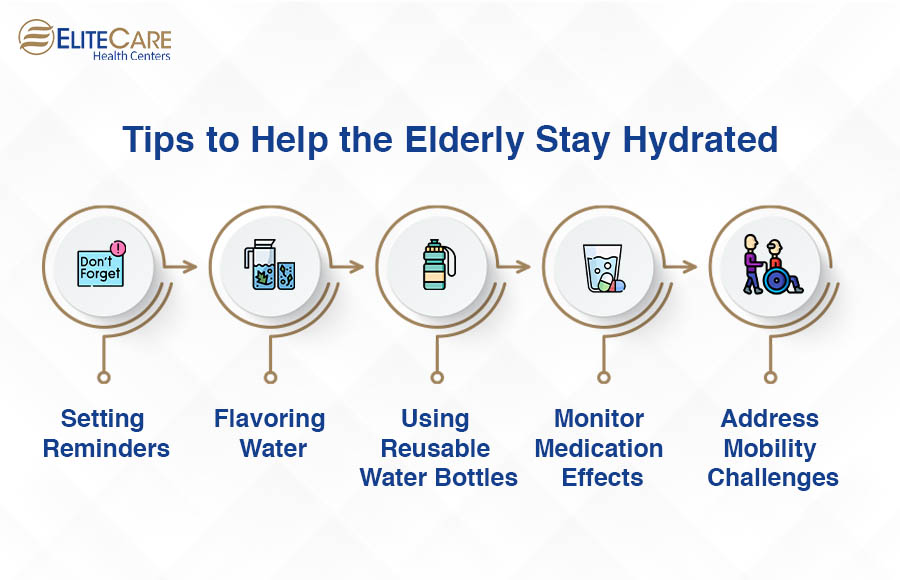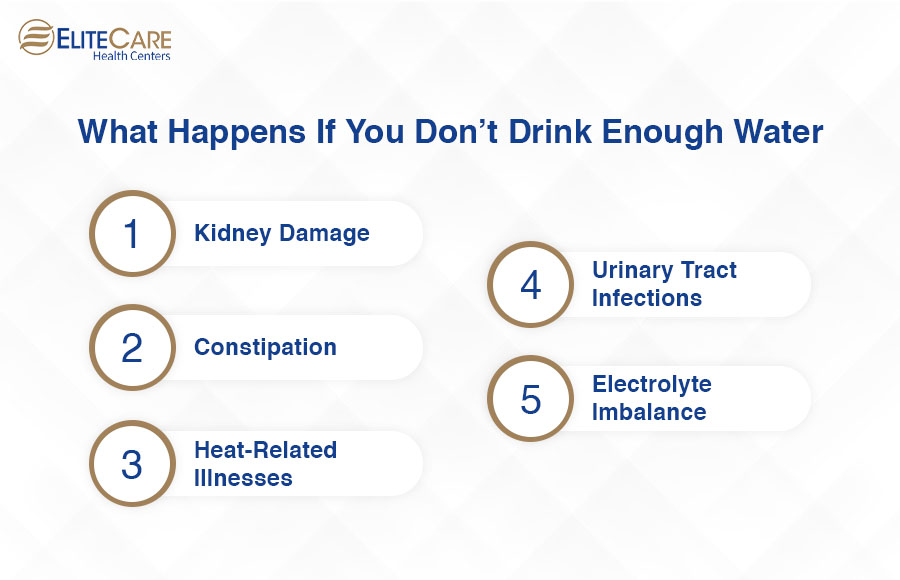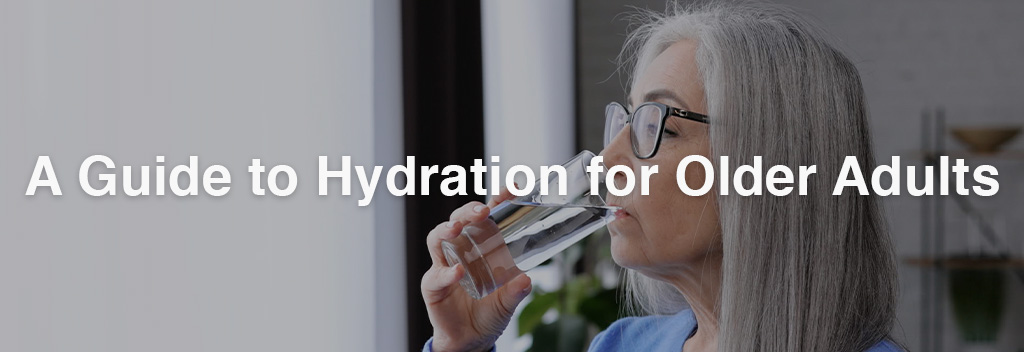
Our bodies change as we get older, and staying hydrated is one area that requires extra care and attention.
Water makes up a sizable portion of the human body’s weight and is an essential component. It is essential for several physiological processes, such as waste removal, temperature regulation, nutrient absorption, and digestion. Sustaining optimal organ function and general well-being requires adequate water.
While maintaining optimal fluid balance is important for overall health, seniors may experience particular difficulty in achieving this.
What is Dehydration?
When the body loses more fluids than it takes in, dehydration sets in, upsetting the delicate equilibrium required for normal physiological processes. Water is essential for preserving the integrity of cells, controlling body temperature, and supporting organ function. Dehydration can result from either excessive fluid loss or insufficient water intake, and older persons are particularly vulnerable to the condition.
Hydration Challenges Faced By Older Adults
Older adults are more susceptible to dehydration due to several factors:
a. Decreased Thirst Perception:
Aging can diminish the sensation of thirst, making them less aware of their body’s need for water.
b. Reduced Kidney Function:
Aging kidneys may become less efficient in concentrating urine, making it harder for the body to retain water.
c. Medication Side Effects:
Many medications prescribed to older adults can have diuretic effects, increasing the risk of dehydration.
d. Mobility Issues:
Physical limitations or mobility issues may hinder older adults from accessing water easily, leading to inadequate fluid intake.
Hydration Assessment Tools
Healthcare professionals use various tools to assess hydration status in older adults, such as urine color charts, blood tests, and skin turgor tests. Understanding these tools can help caregivers and family members monitor hydration levels and take appropriate action.
Determining Water Needs
Each person has different needs for water depending on their age, weight, degree of activity, and general health. Healthcare specialists should be consulted by older persons to ascertain their hydration requirements.
Although there isn’t one single piece of advice that works for everyone, older folks should generally strive to consume 8 to 10 cups (64 to 80 ounces) of fluid per day from all foods and beverages. Adjustments may be necessary due to factors including the environment, physical activity, and health issues.
Tips to Help the Elderly Stay Hydrated
Promoting regular water intake can be challenging for older adults. Strategies include

1. Setting Reminders:
Make it a habit to remind yourself to drink water throughout the day. This is especially important for senior citizens, as they could experience a diminished feeling of thirst.
2. Flavoring Water:
Adding natural flavors, such as citrus slices or mint, can make water more appealing. You can also consider adding electrolytes to your water.
3. Using Reusable Water Bottles:
Keep a reusable bottle close at hand to promote drinking water throughout the day. Regular hydration can be made easier by the accessibility of a nearby water source.
4. Monitor Medication Effects:
In order to control their fluid intake, older persons on diuretic drugs should collaborate closely with their healthcare practitioners. To avoid dehydration, changes to the schedule or amount of medications may be required.
5. Address Mobility Challenges:
Additionally, those with mobility issues must have easy access to water sources. Family members and caretakers can help by setting up accessible water containers and offering support when needed.
Signs of Dehydration in the Elderly
Recognizing the signs of dehydration is crucial for timely intervention. Common symptoms include
- Dark Urine
- Dry Mouth and Throat
- Fatigue and Weakness
- Dizziness or Lightheadedness
- Sunken Eyes: Dehydration can lead to a sunken appearance around the eyes due to fluid loss.
- Dry Skin: Skin turgor, or elasticity, decreases with dehydration, resulting in dry and less resilient skin.
- Rapid Heartbeat: Dehydration can cause the heart to work harder to circulate blood, leading to an increased heart rate.
- Low Blood Pressure: Insufficient fluid in the body can cause a drop in blood pressure, leading to dizziness and fainting.
- Confusion or Irritability: Dehydration can impair cognitive function, resulting in agitation, disorientation, or trouble focusing.
Hydration and Nutrition
Apart from drinks, certain types of food can provide a substantial contribution to total hydration. Fruits and vegetables high in water content, such as oranges, cucumbers, and watermelon, can help increase fluid consumption.
Caffeine and alcohol are two examples of drugs that might exacerbate dehydration. Elderly people should watch how much of these things they consume and make sure to balance them with more water.
What Happens If You Don’t Drink Enough Water

1. Kidney Damage:
Chronic dehydration can strain the kidneys, potentially leading to kidney stones or other kidney-related issues.
2. Constipation:
Inadequate water intake can result in difficulty passing stool, leading to constipation.
3. Heat-Related Illnesses:
Dehydration impairs the body’s ability to regulate temperature, increasing the risk of heat-related illnesses such as heatstroke.
4. Urinary Tract Infections:
Insufficient water intake can concentrate urine, increasing the risk of urinary tract infections.
5. Electrolyte Imbalance:
Dehydration disrupts the balance of electrolytes in the body, which are essential for various physiological functions. This imbalance can lead to muscle cramps, weakness, or irregular heartbeats.
Maintaining proper hydration is a vital component of overall health and well-being for older adults. By understanding the unique challenges they face and implementing practical strategies, caregivers, family members, and healthcare professionals can play a crucial role in ensuring optimal hydration.
As we navigate the waters of aging, let us prioritize hydration to support a healthier and more vibrant life for our older loved ones. EliteCare HC, one of the best medical clinics in Florida, offers personalized health and wellness advice. Visit our website or call +1888-596-2090 for an appointment.
- Tags:best drink dehydrationbest drink when dehydratedbest drinks for dehydrationdehydration best drinkelitecare health centersgood drinks for dehydrationgood hydration drinkshealth and wellness centerhealth and wellness servicesprimary careprimary care physicianprimary care servicessenior care serviceswellness care centerswhat's a good drink for dehydration
Frequently Asked Questions
Since it supports important body processes including digestion, vitamin absorption, temperature regulation, and waste disposal, older people need to drink plenty of water.
Elderly people may have a diminished awareness of their body’s need for water as they age. Dehydration is more likely as a result of this since people might not feel the need to drink water even when their bodies need it.
Common signs of dehydration in older adults include dark urine, dry mouth and throat, fatigue, weakness, dizziness, or lightheadedness.





